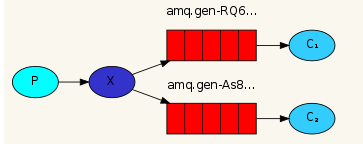一、RabbitMQ的介绍
AMQP,即Advanced Message Queuing Protocol,高级消息队列协议,是应用层协议的一个开放标准,为面向消息的中间件设计。消息中间件主要用于组件之间的解耦,消息的发送者无需知道消息使用者的存在,反之亦然。
主要作用:每个进程(跨语言,系统)之间的中间代理。
二、常用命令与授权角色说明
启动监控管理器:rabbitmq-plugins enable rabbitmq_management
关闭监控管理器:rabbitmq-plugins disable rabbitmq_management
启动rabbitmq:rabbitmq-service start
关闭rabbitmq:rabbitmq-service stop
查看所有的队列:rabbitmqctl list_queues
清除所有的队列:rabbitmqctl reset
关闭应用:rabbitmqctl stop_app
启动应用:rabbitmqctl start_app
2、使用前需要添加用户,授权等
用户和权限设置(后面用处)
添加用户:rabbitmqctl add_user username password
分配角色:rabbitmqctl set_user_tags username administrator
新增虚拟主机:rabbitmqctl add_vhost vhost_name
将新虚拟主机授权给新用户:rabbitmqctl set_permissions -p vhost_name username '.*' '.*' '.*'
角色说明
none 最小权限角色
management 管理员角色
policymaker 决策者
monitoring 监控
administrator 超级管理员
三、exchange交换器的四种类型
1、fanout:分发给exchange绑定的所有queu中

2、direct:把消息路由到那些binding key与routing key完全匹配的Queue中

3、topic:与direct类型的Exchage相似,也是将消息路由到binding key与routing key相匹配的Queue中,但这里的匹配规则有些不同,它约定:(过滤字符串)

4、header

四、简单使用例子
1、RPC进行批量主机执行命令
生产者给消费者消息之后,执行之后结果返回给生产者,这种模式叫做RPC(remote procedure call 远程过程调用)

client:
start:

1 #!/usr/bin/env python 2 # _*_ coding:utf-8 _*_ 3 #Author:chenxz 4 import os,sys 5 Base_dir=os.path.dirname(os.path.dirname(__file__)) 6 sys.path.append(Base_dir) 7 from core import main 8 9 if __name__ == '__main__': 10 obj=main.Main() 11 obj.interactive()
main:

1 #!/usr/bin/env python 2 # _*_ coding:utf-8 _*_ 3 #Author:chenxz 4 import threading 5 import os,sys 6 Base_dir=os.path.dirname(os.path.dirname(__file__)) 7 sys.path.append(Base_dir) 8 from core import producer 9 import uuid 10 11 class Main(object): 12 def __init__(self): 13 self.information={} 14 def interactive(self): 15 ''' 16 每进来一个任务新建一个多线程 17 :return: 18 ''' 19 while True: 20 cmd_inp=input('>>').strip() 21 if not cmd_inp: 22 continue 23 t=threading.Thread(target=self.dealwith,args=(cmd_inp,)) 24 t.start() 25 # cmd_list = cmd_inp.split('"') 26 # cmd=cmd_list() 27 # print(cmd_list) 28 def dealwith(self,cmd_inp): 29 ''' 30 处理输入的命令,并映射到对应的方法(run check check_all) 31 :param cmd_inp: 32 :return: 33 ''' 34 cmd_list = cmd_inp.split('"') 35 36 operate=cmd_list[0].strip().split(' ')[0] 37 print(operate) 38 if hasattr(self,operate): 39 getattr(self,operate)(cmd_list) 40 else: 41 print('命令输入错误:%s'%cmd_inp)# 42 43 def run(self,cmd_list): 44 cmd=cmd_list[1].strip() 45 hosts_list=cmd_list[2].strip().split(' ')[1:] 46 print(cmd,hosts_list) 47 for ip in hosts_list: 48 #producer_obj=producer.Producer() 49 #response=producer.send(cmd,ip) 50 task_id=uuid.uuid4() 51 response =['queue_123','12345678'] 52 self.information[task_id]={'host':ip,'cmd':cmd,'corr_id':response[1],'callback_queue':response[0]} 53 print( self.information) 54 55 def check_all(self,cmd_list): 56 print('存在以下任务:') 57 for i in self.information: 58 print("task_id(%s): %s 主机执行 %s 命令"%(i,self.information[i]['host'],self.information[i]['cmd'])) 59 60 def check_task(self,cmd_list): 61 task_id=cmd_list[0].strip().split(' ')[1] 62 print(task_id) 63 callback_queue=self.information[task_id]['callback_queue'] 64 corr_id=self.information[task_id]['corr_id'] 65 consume_obj=producer() 66 response=consume_obj.receive(callback_queue,corr_id) 67 print(response.decode()) 68 del self.information[task_id] 69 if __name__ == '__main__': 70 obj=Main() 71 obj.interactive()
producer:

1 #!/usr/bin/env python 2 # _*_ coding:utf-8 _*_ 3 #Author:chenxz 4 import pika 5 import uuid 6 7 class Producer(object): 8 def __init__(self): 9 self.connection=pika.BlockingConnection(pika.ConnectionParameters(host='192.168.106.25',credentials=pika.PlainCredentials('root','123'))) 10 self.channel=self.connection.channel() 11 def send(self,body,queue_name): 12 #设置返回时的队列名self.callback_queue和随机生成任务id号码self.corr_id 13 result=self.channel.queue_declare(queue='',exclusive=False) 14 self.callback_queue=result.method.queue 15 self.corr_id=str(uuid.uuid4()) 16 #发送消息 17 self.channel.publish(exchange='', 18 routing_key=queue_name, 19 properties=pika.BasicProperties(reply_to=self.callback_queue,correlation_id=self.corr_id), 20 body=body) 21 return self.callback_queue,self.corr_id 22 23 def receive(self,callback_queue,corr_id): 24 self.callback_id=corr_id 25 self.response=None 26 self.channel.basic_consume( 27 on_message_callback=self.callback, 28 queue=callback_queue, 29 ) 30 while not self.response: 31 self.connection.process_data_events() 32 return self.response 33 34 def callback(self,ch,method,props,body): 35 if self.callback_id==props.correlation_id 36 self.response=body
server:
start:

1 #!/usr/bin/env python 2 # _*_ coding:utf-8 _*_ 3 #Author:chenxz 4 5 import os,sys 6 Base_dir=os.path.dirname(os.path.dirname(__file__)) 7 sys.path.append(Base_dir) 8 from core import main 9 10 if __name__ == '__main__': 11 obj=main.consumer() 12 obj.start()
main:

1 #!/usr/bin/env python 2 # _*_ coding:utf-8 _*_ 3 #Author:chenxz 4 import pika 5 import os 6 7 class consumer(object): 8 def __init__(self): 9 self.connection=pika.BlockingConnection(pika.ConnectionParameters(host='192.168.106.25',credentials=pika.PlainCredentials('root','123'))) 10 self.channel=self.connection.channel() 11 def start(self): 12 #获取ip 13 ip=123 14 self.channel.queue_declare(queue=ip) 15 self.channel.basic_consume(on_message_callback=self.callback, 16 queue=ip, 17 ) 18 self.channel.start_consuming() 19 def callback(self,ch,method,props,body): 20 corr_id=props.correlation_id 21 callback_queue=props.reply_to 22 #执行命令,返回结果 23 response=self.handle(body) 24 self.channel.basic_publish(exchange='', 25 routing_key=callback_queue, 26 properties=pika.BasicProperties(correlation_id=corr_id, 27 ), 28 body=response) 29 ch.basic_ack(delivery_tag=method.delivery_tag) 30 31 def handle(self,cmd): 32 cmd=cmd.decode() 33 message=os.popen(cmd).read() 34 if not message: 35 message='wrong cmd' 36 return message
#!/usr/bin/env python
# _*_ coding:utf-8 _*_
#Author:chenxz
import os,sys
Base_dir=os.path.dirname(os.path.dirname(__file__))
sys.path.append(Base_dir)
from core import main
if __name__ == '__main__':
obj=main.consumer()
obj.start()
